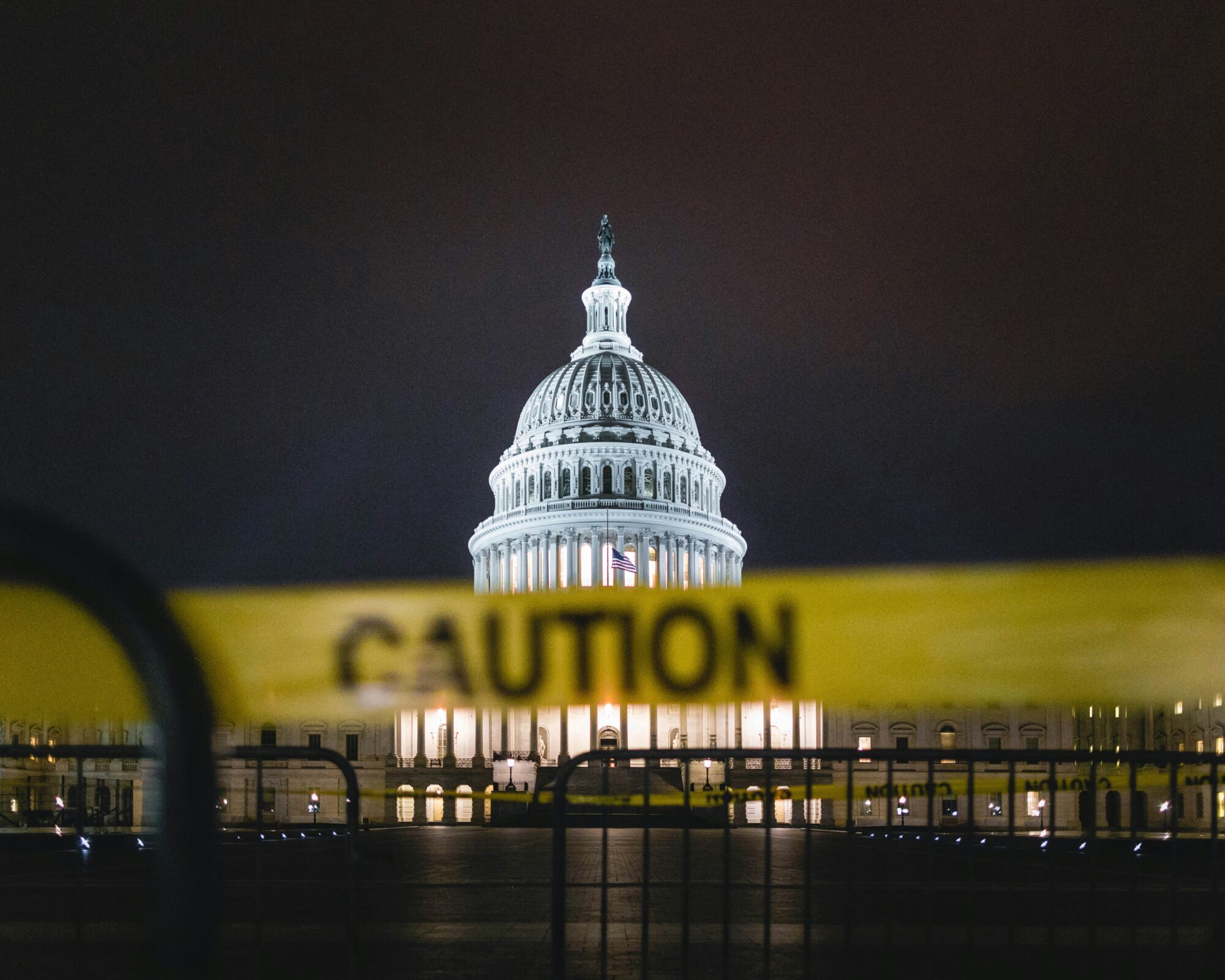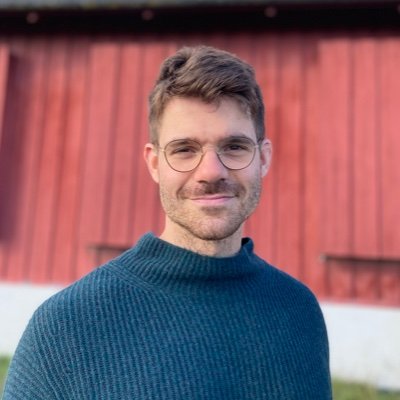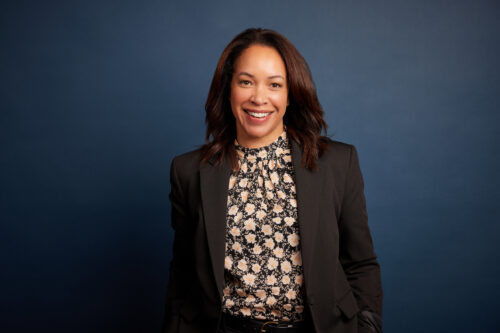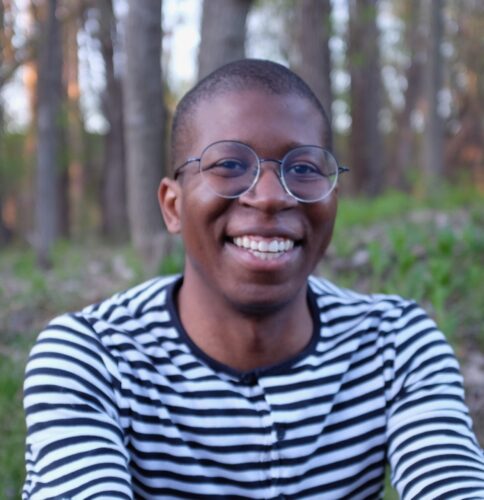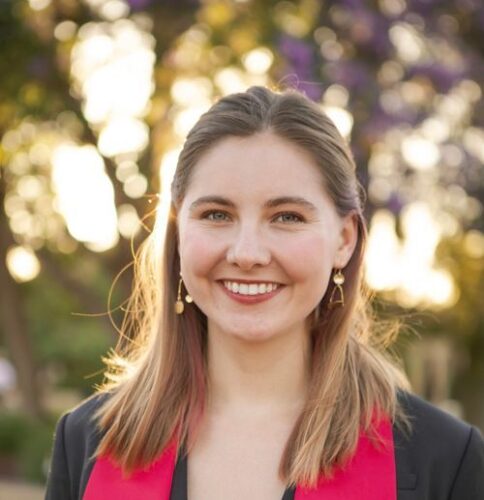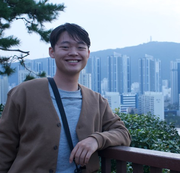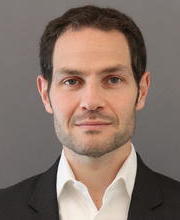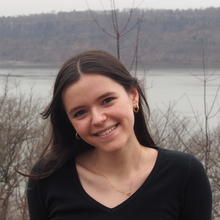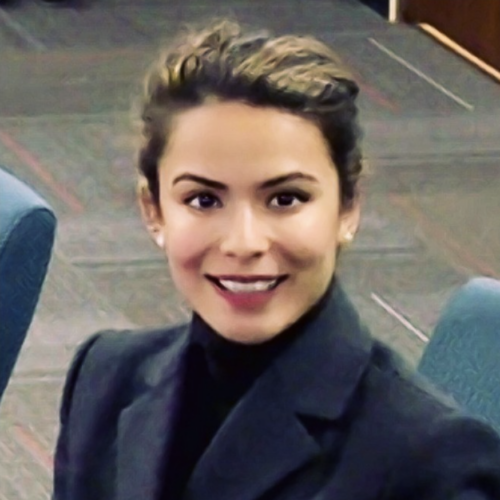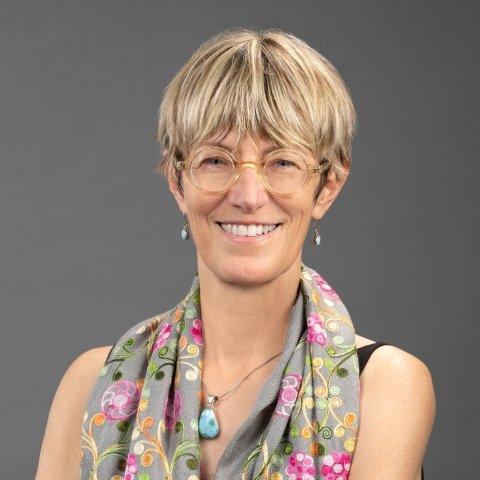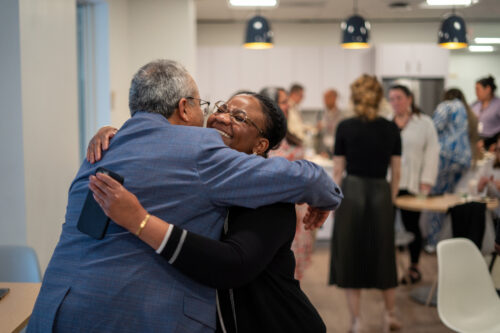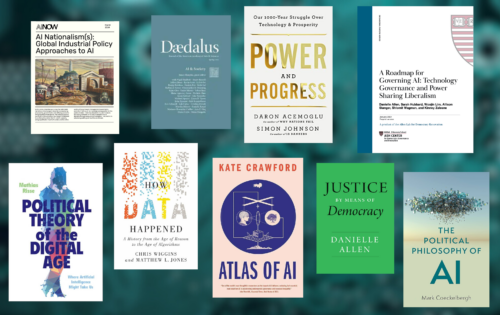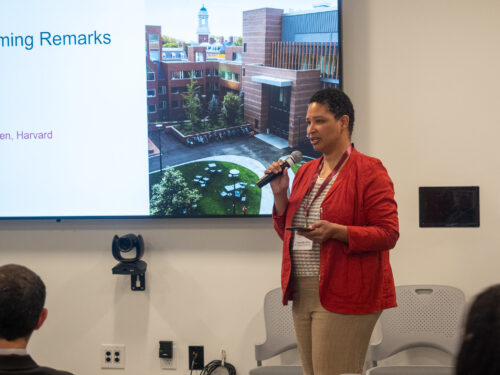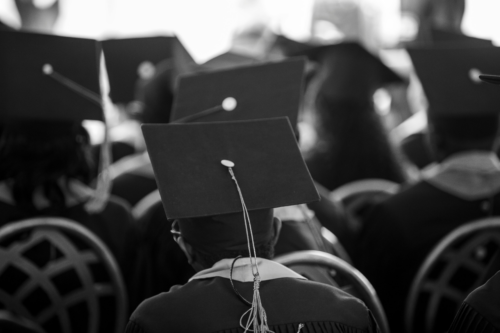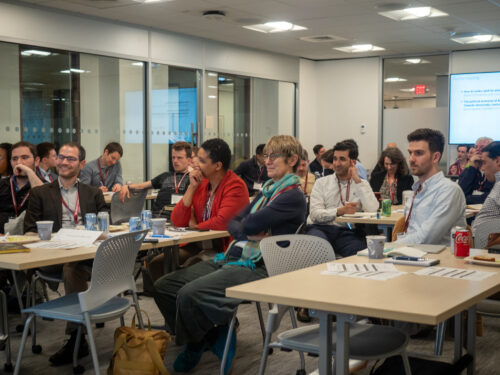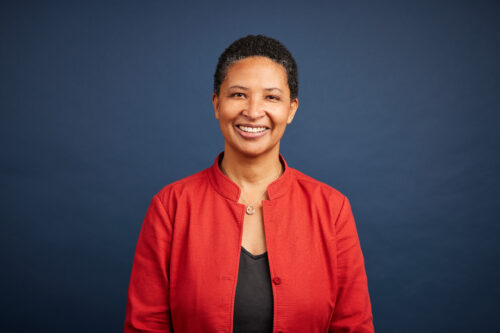
Danielle Allen
Professor of Public Policy, HKS;
James Bryant Conant University Professor, FAS
Renovating our democratic institutions for the 21st century.
The Allen Lab for Democracy Renovation addresses the threats to American and global democracies with research and field-building to support power-sharing liberalism. Just societies require robust political equality, fully inclusive institutions, and broader avenues for participation and connectedness, all of which rest on the material and social bases for human flourishing. Our multidisciplinary community of scholars, practitioners, and partner organizations work together to shepherd concepts and reforms into practice—to translate research into impact. From community-led initiatives to national-level policies and structural reforms, the Allen Lab works to renovate American democracy.
Professor of Public Policy, HKS;
James Bryant Conant University Professor, FAS
Doctoral Student, Harvard Chan School of Public Health
Researcher, Harvard College
Executive Assistant to Danielle Allen
Researcher, Harvard College
Non-Resident Senior Fellow, Allen Lab for Democracy Renovation
July 2024-June 2025
Research Coordinator, Allen Lab for Democracy Renovation
Senior Lab Director, Allen Lab for Democracy Renovation
Doctoral Student, Harvard Government Department
Senior Fellow, Allen Lab for Democracy Renovation
Principal Investigator;
Post-Doctoral Fellow, Columbia University
Researcher;
Doctoral Student, Harvard Government Department
Researcher, Harvard College
Visiting Fellow, Allen Lab for Democracy Renovation
Senior Fellow, Allen Lab for Democracy Renovation
Researcher, Harvard College
Researcher;
Master in Urban Planning Candidate, Harvard Graduate School of Design
Lab Program Manager, Allen Lab for Democracy Renovation;
Doctoral student, Harvard Gov Department
Senior Fellow, Allen Lab for Democracy Renovation;
Co-Director and Co-Investigator, GETTING-Plurality Research Network
Communications, Harvard College
The lab currently supports four research workstreams, all with accompanying impact projects.
Work is carried out through weekly lab and workstream meetings, reading groups, stakeholder convenings, foundational paper development and publication, development of policy guidance, editorial meetings, and dissemination and engagement convenings and activities. Activities are supported with robust project management. The overarching outcome will be a new paradigm for policy-making, and exemplary policies, supportive of democracy in 21st century conditions of digitality, complexity, scale, mobility, heterogeneity, and climate change.
GETTING-Plurality is a multi-disciplinary research network linking philosophers, social scientists, computer scientists, legal scholars, and technologists. The team is building a unique collaborative that unites tech ethics initiatives at Harvard University with external impact partners across higher education and the tech industry, bringing philosophers and ethicists to the table for every project.
We’re at a pivotal moment. In order to promote universal well-being, we need to promote the responsible governance of innovation and responsibly innovate the way we govern.
The GETTING-Plurality teams seeks to advance the understanding of how to shape, guide, govern, and deploy technological development in support of democracy, collective intelligence, and other public goods. The focus is on how to do so, given the plural nature of human and artificial intelligence. The team pursues foundational analysis and theory, field-building, and policy development in key focus areas to foresee and mitigate potential harms to democracy and to strengthen the public benefit and democracy-supportive effects flowing from technology innovation.
The PEPL Team seeks to develop exemplary policies intended to anchor the paradigm of power-sharing liberalism. On this paradigm, inclusive and dynamic—or “empowering” —economies serve to support healthy democracy. Empowering economies depend on the integration of all members of society into production, and the benefits that flow from it. The economy should work for people, not the other way around. The focus is on supply-side progressivism with investment in foundations of flourishing (from housing to education) and pursuit of abundance in those critical goods through technological and organizational innovation (i.e. solutions to the collective action problems that cause scarcities). Exemplary policies have been developed in the domains of housing, transportation, education, good jobs, justice and safety, health, and climate.
Teams are currently working on innovating exemplary policy in the domains of education and public health and safety. The education team is working on infrastructure to support innovation in credentialing via next-generation badging of competency-based mastery. The public health and safety team is working on pathways to success for racial health equity in alternative emergency response programs.
The PEPL team also seeks to convene the many networks of scholars around the world working to develop a new paradigm in political economy that can respond effectively to the pressing political economy problems of our time—including stalled mobility and dysfunctional immigration policies; the climate crisis; social alienation, disempowerment, and violence.
Collaborating impact organizations include the Justice, Health, and Democracy Impact Initiative; the Democratic Knowledge Project; and Abundance California.
The work of the AF Team starts from recognition of the value for social resilience and human flourishing of federalist, federated, and even decentralized structures of governance, especially as a response to the scale and complexity of human social organization in the 21st century. The team focuses on the specific case of U.S. federalism and the jurisdictional and organizational innovations that can improve state capacity and secure responsive governance in contemporary conditions. AF Teams are currently working on governance innovations to support accelerated siting of renewable energy projects, fiscal federalism, and a strategy of harmonized federalism in support of increased investment in civic education.
Collaborating impact organizations currently include Educating for American Democracy.
The RAD Team contributed to the American Academy of Arts and Sciences’ Our Common Purpose Commission and Report and to the development of a holistic, 360° degree standard for understanding the elements of healthy democracy. The Team continues to contribute to the ongoing Our Common Purpose research and strategy work, as well as exploring further challenges to full participation in U.S. democracy. Current projects are focused on civic education in higher education, digital civic infrastructure, America’s 250th anniversary, and immigrant integration and participation.
Collaborating impact organizations currently include the American Academy of Arts and Sciences, Partners In Democracy and The Council on Civic Strength.
In-Person Event
Ash Center Foyer, Suite 200, 124 Mount Auburn Street
4:00 pm – 6:00 pm EDT
Podcast
Check out the podcast episodes from the Allen Lab for Democracy Renovation’s Conference on the Political Economy of AI to glean insights from each panel.
Case Study
In this new Occasional Paper from the Allen Lab for Democracy Renovation, Hannah Kunzman and Danielle Allen offer a case study on contestation over K–12 civics curriculum in Texas.
Feature
This list, curated by the GETTING-Plurality Research Network at the Allen Lab for Democracy Renovation, highlights a mix of foundational texts and new thinking on the timely issue of how AI will impact democracy, especially as we head into election season.
Feature
Experts gathered at the Allen Lab conference to examine the incentives and structures of AI development, as well as to discuss the past, present, and potential future of steering AI towards better serving the public interest.
Feature
In new paper, Danielle Allen explores how higher ed can play a role in promoting the health of our democracy.
Feature
From misinformation to AI panic, experts joined the Allen Lab’s GETTING-Plurality event to discuss the threats the burgeoning technology poses to democracy.
Video
The GETTING-Plurality Research Network at the Ash Center’s Allen Lab and Connection Science at MIT Media Lab hosted a webinar event focused on “AI and the 2024 Elections”. In this session, we hear from Danielle Allen, Harvard University; Sandy Pentland, Massachusetts Institute of Technology; and Nate Persily, Stanford University. Each presenter gives a lightning talk, followed by audience Q&A.
Video
The Political Economy of AI Conference was convened by the GETTING-Plurality Research Network, a project of the Allen Lab for Democracy Renovation, housed at the Harvard Kennedy School’s Ash Center for Democratic Governance and Innovation.
Additional Resource
GETTING-Plurality Research Network members Allison Stanger and Woojin Lim, along with other authors, published “Terra Incognita: The Governance of Artificial Intelligence in Global Perspective” in the Annual Review of Political Science.
Video
The GETTING-Plurality Research Network at the Ash Center’s Allen Lab and Connection Science at MIT Media Lab hosted a webinar event focused on “AI and the Future of Privacy”. In this session, we hear from Bruce Schneier, security technologist, and Faculty Affiliate at the Ash Center; Sarah Roth-Gaudette, Executive Director of Fight for the Future; and Tobin South, MIT Ph.D. Candidate and Fulbright Scholar. Each presenter gives a lightning talk, followed by audience Q&A.
Policy Brief
We face a fundamental question: is the very pursuit of Artificial General Intelligence (AGI) the kind of aim democracies should allow?
Additional Resource
This essay was adopted from a presentation given by Aviv Ovadya at the Second Interdisciplinary Workshop on Reimagining Democracy held on the campus of Harvard Kennedy School in December 2023.
Additional Resource
“The Real Dangers of Generative AI” by Danielle Allen and Glen Weyl was featured in the January 2024 Journal of Democracy.
Abstract: As perhaps the most consequential technology of our time, Generative Foundation Models (GFMs) present unprecedented challenges for democratic institutions. By allowing deception and de-contextualized information sharing at a previously unimaginable scale and pace, GFMs could undermine the foundations of democracy. At the same time, the investment scale required to develop the models and the race dynamics around that development threaten to enable concentrations of democratically unaccountable power (both public and private). This essay examines the twin threats of collapse and singularity occasioned by the rise of GFMs.
Occasional Paper
Video
The “Advancements in Global AI Policy” webinar featured the following speakers and topics:
